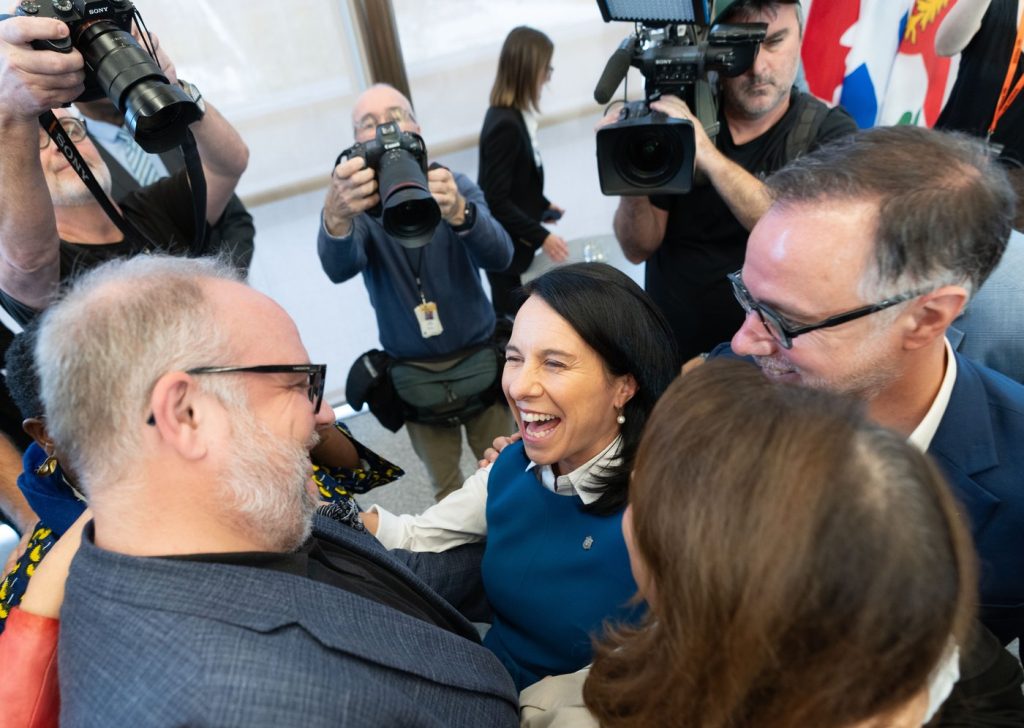Five things about Montreal Mayor Valérie Plante, who won’t seek re-election in 2025

MONTREAL — Montreal Mayor Valérie Plante says she will quit municipal politics after serving the final year of her second term, which comes to an end in November 2025. Known for her trademark laugh and positive energy, here are five things about the municipal politician first elected as a city councillor in 2013.
Montreal’s first elected female mayor: The City of Montreal’s 45th mayor was the first woman elected to the job, in 2017. During the preceding election campaign, Plante wasn’t well-known to voters as she locked horns with Denis Coderre, a former Liberal cabinet minister, who had been the city’s bombastic incumbent mayor since 2013. A campaign poster depicting a smiling Plante adorned with the slogan “l’homme de la situation” (the right man for the job) caught everyone’s attention. Before upsetting Coderre in 2017, she defeated former Parti Québécois cabinet minister and ex-Montreal mayoral candidate Louise Harel to win a council seat in 2013.
Speaking out against online abuse: Plante came under fire this year for having limited the comments on her social media accounts, but defended the decision, saying she had received a torrent of abuse for months. A civil rights groups and the Opposition at city hall criticized the decision, saying it limited freedom of expression, but Plante disagreed. She said some may think women in politics are required to accept vulgar, threatening and often violent abuse online; however, she said she thought otherwise.
Advertisement
A Montreal vision: Greener, bike-friendly, climate-resilient — under Plante’s administration, the city’s green spaces have expanded. As well, she has championed so-called “sponge parks,” often made of rocks or soil, which capture rainfall and reduce flooding. The city has 1,065 kilometres of bike lanes, including the express bike network, available year-round. But there has been criticism about the propensity for bike infrastructure and seemingly endless construction, notably in downtown Montreal. A proposed “Pink Line” for Montreal’s metro — a 29-station link between the west and the north of the city — never materialized despite being one of her key election promises. Plante said she will spend her final year pushing to adopt “one of the major legacies of my administration”: the city’s urban planning and mobility plan unveiled in June 2024, which sets out what the city will look like in the next quarter century.
A new leader for Projet Montreal: Plante won the mayoralty in 2017, and in 2021 she increased her share of the popular vote. She is the second full-time leader of the municipal party, taking over in 2016 from its founder, Richard Bergeron, who led the party through elections in 2005, 2009 and 2013. Plante’s departure means the party will now elect a third leader. During her speech, she noted that “it (the party) existed before me and it will continue to evolve. In fact, that’s why Montrealers chose us twice. They know who we are and what we stand for.”
Plante is an author: She published a pair of graphic novels with illustrator Delphie Côté-Lacroix. In 2020, she published a graphic novel “Okay, Universe: Chronicles of a woman in politics” that tells the story of Simone Simoneau — modelled on Plante — a young community organizer who decides to take the plunge into politics by running for a seat on city council. The second book, “Comme des renardes,” published in March 2024, is about whether Simoneau would run for the leadership of her party — mimicking her own foray into the municipal political world. In an interview with The Canadian Press, Plante said she had toyed with the idea of publishing a book after she won the mayoralty in 2017. Writing a typical political autobiography didn’t appeal to her, she said.
This report by The Canadian Press was first published Oct. 23, 2024.
Advertisement
Sidhartha Banerjee, The Canadian Press